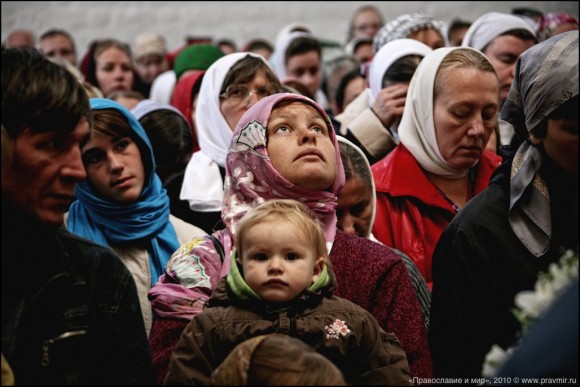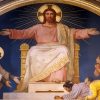Battersea
7 February 1989
The subject which was suggested to me is Prayer and Living and I think we must be aware at the outset that unless our praying is an expression of our living and if our living is not an embodiment of our praying, either of the two or both have gone wrong. It is useless to pray to God for something to occur and do nothing that it should occur. It is useless also to live according to the world and ask God in our prayers to make our worldly ways a way, a manner of building the Kingdom.
 So I would like to start on that and think aloud about it. Very often when we pray, we are asking the Lord to do for us, in our favour or in the favour of our friends what He expects us to do for Him, or we expect that when we are afflicted with one or another bad characteristic, it would be so simple if the Lord simply removed it. And yet our relationship with God is a two-way traffic as it were, our relationship with God is a co-operation, it is not a situation in which we turn to God for help hoping that He will do all of it while we passively are at the receiving end. And in that respect I remember a story from the life of a Western Roman Catholic saint called Phillip of Neri. He was a monk, but monk or not, he was very hot under the collar and he very easily got cross, infuriated and within a comparatively short time he had all the monastery up in arms against him with the exception of two or three particularly patient or humble brothers. At a certain moment he became aware of it and he felt it can not last but he was going to hell by being what he was. So he went to the chapel, knelt before a statue of the Lord Jesus Christ and with all the sincerity of his heart, all the conviction he had and also the awareness that he needed divine help, he asked the Lord to grant him patience. Having prayed his full, he came out of the chapel, and as he was walking back to wherever he had to go, he met one of the two brethren who always had been kind to him. He greeted him, made a remark, and this brother who had always been so good, answered rudely, so he flared up, abused him and went on muttering, and he ran into a second brother who always had been good to him. “What happened to you, Phillip?” said the brother, “Why do you look so furious? What’s the rage about?” “O,” he said, “can you imagine that I met brother so and so, I said just this little phrase and he answered impertinently to me, rudely to me.” “O, good,” said his brother, “for once you have heard a friend of yours express his opinion.” So Phillip flared up even more. And then he stopped right in the middle of his tracks, thought one moment and rushed back to the chapel. He fell on his knees at the foot of the statue and said, “Lord, have I not asked You to grant me patience?” And from the statue came a voice saying, “Yes, Phillip, and I am multiplying the occasions for you to learn it.”
So I would like to start on that and think aloud about it. Very often when we pray, we are asking the Lord to do for us, in our favour or in the favour of our friends what He expects us to do for Him, or we expect that when we are afflicted with one or another bad characteristic, it would be so simple if the Lord simply removed it. And yet our relationship with God is a two-way traffic as it were, our relationship with God is a co-operation, it is not a situation in which we turn to God for help hoping that He will do all of it while we passively are at the receiving end. And in that respect I remember a story from the life of a Western Roman Catholic saint called Phillip of Neri. He was a monk, but monk or not, he was very hot under the collar and he very easily got cross, infuriated and within a comparatively short time he had all the monastery up in arms against him with the exception of two or three particularly patient or humble brothers. At a certain moment he became aware of it and he felt it can not last but he was going to hell by being what he was. So he went to the chapel, knelt before a statue of the Lord Jesus Christ and with all the sincerity of his heart, all the conviction he had and also the awareness that he needed divine help, he asked the Lord to grant him patience. Having prayed his full, he came out of the chapel, and as he was walking back to wherever he had to go, he met one of the two brethren who always had been kind to him. He greeted him, made a remark, and this brother who had always been so good, answered rudely, so he flared up, abused him and went on muttering, and he ran into a second brother who always had been good to him. “What happened to you, Phillip?” said the brother, “Why do you look so furious? What’s the rage about?” “O,” he said, “can you imagine that I met brother so and so, I said just this little phrase and he answered impertinently to me, rudely to me.” “O, good,” said his brother, “for once you have heard a friend of yours express his opinion.” So Phillip flared up even more. And then he stopped right in the middle of his tracks, thought one moment and rushed back to the chapel. He fell on his knees at the foot of the statue and said, “Lord, have I not asked You to grant me patience?” And from the statue came a voice saying, “Yes, Phillip, and I am multiplying the occasions for you to learn it.”
I think this is a very important story in its way. I may have spoken too long about it but I wanted you to perceive it as I have perceived it — it is an important thing. We ask God to do things and we expect Him to do everything, Him to remove from our way one difficulty or another, Him to change us inwardly so that we can become the wonderful person we, and most of the time we alone, imagine we are.
So this is the first thing — when we pray to the Lord we must not only ask Him to help us, and the word “help” should replace “do” for us, but we must also pledge ourselves to doing everything in our power to achieve with God’s help, God’s grace what must be achieved. I said ‘with God’s help and God’s grace’ because without Him we can do nothing. The Lord Jesus Christ had said it quite plainly, “Without Me you can do nothing.” But also He does not treat us as inert instruments, He does not treat us as though we were clay He moulds and remoulds according to circumstances. We are co-workers with Christ and co-workers not only in the work of Christ in the world but first of all, foremost we are co-workers with Him in making ourselves into Christian people. We can not do this with our own strength and power, we can not change ourselves unless divine grace is granted us but God gives the grace, God gives the strength, we must use them.
You remember the words which St. Paul spoke faced with his mission, with the incredible vastness and complexity of his missionary work. He turned to the Lord asking for strength and the Lord answered, “My grace suffices unto thee, My strength deploys itself in weakness.” What kind of weakness? That is a very important thing for us to realise — not the weakness of the lazy, not the weakness, which we show when we are cowardly, not the weakness, which we show when we are slothful. That is not the kind of weakness which God can use for His purpose but there is another weakness — the suppleness, the transparency, which would allow God’s light to shine through us or God’s power to be manifest in our actions.
And I could give you two or three images to make clear what I wanted to say. When we are small, a moment comes when our mother decides to teach us how to form letters with a pencil on a sheet of paper. She puts a pencil into our hand, takes our hand into hers and begins to draw lines. And as long as we do not know what she intends to do, as long as we abandon ourselves to her hand, o, how beautiful the letters are. The straight lines are straight, the curves are curved; and then, alas, we think we have understood, we become helpful and when we see her moving in one direction, we push into that direction while she meant only to move a quarter of an inch and then come back in a circle or in a loop. This is what we do so often with God. As long as we do not understand, as we do not know or imagine that we know what God intends us to do and let ourselves go into His hand, He can move this hand of ours. The moment we say to God, “I know now exactly what You want, I’ll do it,” then everything goes (?)
And another example which is perhaps professional to me because I was a surgeon before I became a priest, is that of the surgical glove on the hand of a surgeon. Why is it that the surgeon’s hand can work almost miracles? Because the glove is so thin, so frail that it opposes no resistance. The wise, trained hand in this glove can do whatever it wants as though there was no glove. This is how we should be in the hand of God, like a glove on His hand that He can move freely.
And then there is another example that came to my mind once when I was speaking to a group of children, that of a sail, the sail on a ship. The sail is the frailest part of a ship and yet, it is because it is so frail that directed by a knowledgeable crew it can turn in such a way as to engulf the wind and carry the heavy structure which is the boat, the ship to its destination, to its haven. If it was a solid, heavy board, it could not be manoeuvred that way. Its very frailty that conditions its suppleness that allows it to be used by the wind to carry the ship. And if you remember that in ancient languages the word “spirit” and the word “wind” are the same one, you will realise what I mean when I say that we must surrender, abandon ourselves to the blowing of the Spirit that will carry us wherever God intends us to be at times without telling us, at times, telling us where He calls us to go. But we must remember that we are all in the situation of Abraham who was called by the Lord and told, “Go! Go to the land to which I will lead you.” There was no destination marked on a map, it was the inspiration of God that led Abraham to where he had to go and where he had to settle.
I am speaking for quite a while on this aspect of things because it is very important for us to realise that there is a continuous co-operation between God and us, that prayer does not dispense, free us from the necessity of doing intelligently, actively but obediently what God intends us to do and you must remember also that the word “obedience” comes from a Latin root that means “listening”, “lending an ear”. Now, praying is related to this listening in a very-very direct manner and in two ways perhaps. The first one is that all too often we think that we are the initiators of the process of prayer, that we talk to God and then we listen and very often we complain that God does not answer. It seems to us that we speak into an empty sky. I cry and God is silent. It is not true — the initiative is God’s. For one thing we are aware of God only because He makes us aware of Himself. We do not invent the existence of God, we perceive it. God is first of all an experience we have and not an idea or a theory.
You know, I am a foreigner as you obviously can see from my English, and therefore I look up words in a dictionary which you take for granted. So when I came to this country 40 years ago without a word of English in my possession, I looked up the word “God” among other words and I discover that the word “God” comes from a pre-Germanic root that means “one before whom one prostrates oneself in adoration”. Eh, that means that God is first and foremost a direct experience. It is not a sort of world outlook or someone about whom we have heard vaguely from a grandmother or from the parson of our church. God is known within and that means that He is the one that takes the initiative because we could go round the whole world without perceiving this existence, this presence, this life-giving presence of His. And this is what the French writer Pascal in the XVII century said in one of his letters when he says that he was asking himself about God and he heard within himself as it were a voice saying, “You have found Me, you would not search for Me had you not already found Me.” Because one searches with something one has already a perception of. So that the initiative is always God’s own and this initiative comes to us, reaches us in a variety of ways. I can give you a few examples.
The founder of the Russian Student Christian Movement was a noble man from Finland. He began his carrier by being a total atheist without any interest in God but hungry for something that would be greater than him and that would make sense of life because he felt that life was too shallow, too poor, too small for the vastness he perceived in himself. He met then someone whom I have known when I was a young man, who told him about God but having heard about Him but not met Him, he had no use for God. He felt that, yes, here was a man, a medical student who knew God, who possessed a meaning in life, whose life was fulfilled and who told him that his life could be as fulfilled as his if he found Him and he did not know how to find Him. So he struggled within himself with his mind, with his heart, with the way he lived, with everything that was him, he struggled within himself and then could find nothing, and he came to a point of despair in the sense that he felt he could do nothing to force God into his presence, to force God to reveal Himself. And once being in Finland on holiday, walking in one of the many forests of the country, he came to a point of true desperation, he felt that life could make no sense, no sense whatever if God did not reach out to him, and he turned to Him and said, “Lord, if You exist, give me a sign,” and at that moment his whole being was filled with a sense of peace, of certainty, of serenity and he knew that he had met God. Then he began to search for witnesses and the first witness of course he turned to was the Gospel. And then there, in the Gospel he heard God speaking to him directly, in human words, in human action, in the unfolding of a human personality that was the incarnate Son of God, God become Man, true God and true Man at the same time.
And then prayer became something simple for him because it was enough for him to take the Gospel, to read a passage and to respond to it with his heart, with his mind and then address the God who had been speaking to him and respond, and then sit back, and ask himself, “But then if that was my response in word, in feeling, in thought, what shall be my response in action, in life?’ Because it is not enough to say to the Lord, I believe Your words. They must become incarnate, they must become life itself, they must become action, being. And so he began to see that the discovery of God, the response of God in prayer led inevitably by necessity to a change in his life. He could not proclaim a God of truth and be careless about the truth, not only divine truth but the truth of life, the truth of his words. He could not tell lies and call the spirit of truth to indwell him, he could not compromise and ask the spirit of truth to be with him. He had to change his life in every detail. And then he discovered what I have been trying to convey very poorly that life, action and prayer are inseparably united because we can say nothing to God unless we do it. If we do not become the doers, we are liars when in the evening we come to God and have a cosy chat with Him saying, “I am sorry, I have been this and that and the other in the course of the day. Could You do something for me: first to be forgiven and secondly to be different tomorrow.” That does not work.
The second thing I wanted to attract your attention to is a Russian story, a Russian story which I would preface in a following way. We should be aware more than we are that there is nothing in life, no person whom we meet in life which is not a Godsend. There is nothing that happens, which happens without God’s positive will or without God’s consent for us to be a Christian in a given situation, for us to be His messenger or to receive His message. There is nothing in our life which is a chance event.
And I will tell you this story which is a children’s story, which told to children would be a great deal longer than the way in which I will present it to you. A very well-known man was invited one day by his ruler and told that he wanted to check his wisdom, and the wise man said, “Please, do.” “I will ask you three questions,” said his king, “and I give you a week to answer.” “O, I need not a week. Ask your questions. I have spent my whole life reflecting on things.” So the questions were – could you tell me who is the most important person in the world? What is the most important minute in life? and what is the most important action one can perform?”
The wise man looked rather anguished, expressed his gratitude for the week’s respite and left. He went to his books of course first of all and they gave no answer to these stupid questions of a layman. He turned then to his friends – they had nothing to say. Then he went round and round asking everyone and received no reply. And the days passed. And on the morning of the day when he was to present himself to his king he was on his way and passed through a meadow where a little peasant girl was minding among small flock of geese. The girl looked at him and said, “Don’t you look miserable? What’s the matter with you?” He shrugged his shoulders and said, “You couldn’t even begin to understand what the matter is.” “O,” she said, “why?” You know the way in which children say, “Why?” And he said, “Well, I am the most learned man in the country and I cannot answer three questions, which I was asked. So what about you?” “And what are the questions?” said the little girl. So he shrugged his shoulders and said, “What is the most important moment in life?” “O,” said the girl, “that’s quite simple. It’s the present moment because the past is gone and the future is not yet there.” “O,” said the wise man, “and what is the most important person in the world?” “O,” said the little girl, “the person with whom you are at this moment because there is no-one else.” The wise man looked in surprise and said, “And what is the most important action I can perform?” “But,” said the girl, “at this present moment to do the right thing about this only person.”
Well, if we reasoned that way, and if we treated our life that way, if we realised that when we are with one person, it is this person that matters and no-one else in the world, that the moment which we spend together, it may be a split second or an hour, is the only one which is in my possession and I must use it to perfection and do the perfect or the near perfect thing I can do at this moment for this person, we would live quite differently. We would not consider a person that chances our way as a nuisance and push him out of our way in view of the next one that will come, that will be also a nuisance. And we would not live always either rehearsing the past or looking into the future because we would be aware that the present moment is the only one which is mine, and we would also realise that there is no such thing as waiting for the right opportunity because the right opportunity is with you now. You have to endure me and you have no other alternative at this moment.
Now, I have discovered that these things are true in more than one way. I would like to quote you two manners in which it came my way because perhaps you will forget all my theory but perhaps the stories will remain and you will be able to brood over them and do something about them. The first one is the way in which I discovered the importance of the present moment and the importance of the man who is opposite me.
During the War after a period in the army I joined the French Resistance in Paris. I came down into the underground on one day and was arrested by the police. I was asked for my papers, which I produced, and on looking at my identity card the policeman said, “Ah, you surname spells with double “o”, you are an English paratrooper.” I said, “Nonsense, man. If I was an English paratrooper, I would have a perfectly French name.” “Well,” he said, “you are a foreigner all the same.” I said, “Yes, I am.” “And what are you?” “I am a Russian,” I said. “You are a liar,” said the man, “we were told that Russians have eyes like this and cheekbones like that.” I said, “I am afraid you confuse the Russians with the Chinese.” “No, sir,” he said, “I am right.” I said, “Well, alright, you are a policeman, you can’t be wrong.” And then he said, “And if you are a Russian, what do you think of the war?” I said, “It’s wonderful.” He said, “And what do you find wonderful about the war?” “We are beating you on all the fronts.” So he looked at me and said, “So, you are fighting National Socialism?” I said, “Yes.” “Then — run. This door is the only one which is not guarded.” And I disappeared.
Now, against this short conversation I discovered two important things, the one is obvious — that this man was of paramount importance. I mean, all the population of Paris had no importance as compared with this man because this man could have arrested me and sent me to torture and death and he had let me go. Who could be more important? But the other thing which I discovered was the importance of the present moment because at the moment when he put his kindly hand on my shoulder and said, “Stop,” I realised that I had neither past, nor future because the past, which was my real past, I would deny because it would mean that other people would be arrested as the result of my being in a Resistance chain, my mother, my grandmother would be arrested and so forth. But I discovered also that I had no future because we think that we have a future because we can imagine what will happen to us in a minute, in an hour, in a day, in a month, but when you do not know at all what can happen to you, then you have a feeling that there is no future. You are in the position of one who has walked into a dark room unknown to him and who has no (?) Darkness begins here, there is no space before him in the same way in which there was no future before me. And because at that moment I had no past and no future, then all was concentrated in an intense present moment and this present moment was decisive for me.
And I discovered that, had discovered that already but less intensely in the first period of the War when I was in the east of France and on the front line. I came one morning early to find eleven wounded soldiers waiting for me. I was very new at the exercise, it was a few weeks after I had arrived at the front line and I thought, “O, how terrible for the last ones to wait until the first ones have been examined and treated. I must be as quick as I can.” So I called one after the other, I looked at wounds, I looked at arms, at chests, at faces, legs, at abdomens and I didn’t see the man. I saw only the wounds. And I did what I had to do, it was quickly done comparatively with the limits of professional duty and the eleven were gone. Then I went to see them in the ward. I could not recognise any of them because I had looked not at men but at wounds, and I discovered further another thing – they all were in a state of shock because they had had no time to have an abreaction. I had looked at wounds, not at people. It took me a long time to force them to have a response to their wounds, their fear, their treatment and their future. When I had another batch of soldiers I made a rule then while I was looking and treating their wounds to look into their face, to make them tell me what had happened, how they had been wounded, what their emotions were, what was the situation, what they had at home, what were their hopes and their fears. And by the time I had done with my hands as much work and as quick a piece of job as I had done before, the men had poured themselves out and when I saw them in the ward, I recognised them and they were not in a state of shock.
Well, this is a very important thing. We must be able to treat the events of life and the people whom we meet in this way – recognising in them messengers from God, circumstances given by God or people sent by God either to receive a message from us or to give us a message. And then when we pray, we can pray with concreteness because all the time you speak to a wounded man, to a terrified man, to someone who has come to see you with a spiritual or a material need, you can pray, “Lord, give me ears to hear, give me eyes to see, give me a perceptive heart, give me a clear intelligence, give me the right will, give me the possibility of doing the right thing at this moment, for this person, in these circumstances.” And when we will have done it, we can ask ourselves, “Have I done it? Lord, if I have spoken the wrong words, erase them from the mind of this person, if I have done imperfectly what I should have done, fulfil what I have done in the mind, in the heart, in the life of this person, send another person who will do better, and forgive me for being blind and deaf and incapable of doing the right thing.”
And so life and prayer can be interwoven all the time because there is no moment when I am not in the presence of God with the memory of all He has said, all He has done for me, all He is in my life indeed in the awareness by faith which is certainty of His presence, or I am in a situation of action or of expectation, expectation that forces me to wait and to wait and be ready for an event and be ready in the right way for a person or for something to happen and also listening to what God has already taught me.
And I will end, I have 5 minutes and 4 seconds to do this, I will end by telling you of the way in which one can prepare for a meeting. I had a grandmother that was very old and when I was a medical student I said to her, “Gran, please, it is summer, it is spring, it is autumn, leave my window open so that my room is filled with air.” When I came back I had to walk along a long avenue from which I saw my window, and every morning I saw that my window was shut and all the way up to the house I thought, “Again Gran has done it, couldn’t she have left it open?! What was the matter with her?!” And when I came I said, “Gran, what have you done!” Then one day I became impatient with myself and tired of myself and I found a way of overcoming my impatience. How? Before I rounded the corner and came in view of my window, I stopped and said, “And now, I bet – my window is shut.” Then I rounded the corner and said, “I have won!” And when I arrived at home, I was absolutely at peace with Gran and happy because I had won thanks to her.
Well, think of the way in which you can apply this various stories to your life. Take it for granted that we are sent as a light into the world. There is no need of light when there is light already. A Russian comic said, what is more useful, the moon or the sun? — Of course the moon because the sun shines when there is bright light about.
So our place is not when there is light or warmth, or perfection. We are the salt of the earth sent to prevent corruption, we are the light of the world to be sent where there is darkness, we are hope, we are faith, we are love to be sent where there is none of it. So the worse the situation, the more we are where we belong, and that is a very important thing to remember, while we expect our Christian function to be in a comfortable lovely Christian surrounding, where everyone loves one another or does as though they loved one another, everyone shows good will, everyone proclaims his faith. That’s no where we are meant to be. We are sent like sheep among the wolves and that we can do only in a total communion of prayer and oneness with God and out of the situation of darkness, of pain, of fear, of horror, we can bring forth a prayer which is true. And I have unfortunately no time to give you examples of this.
Thank you for having been patient…



















